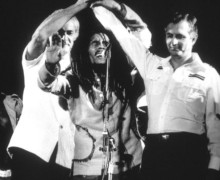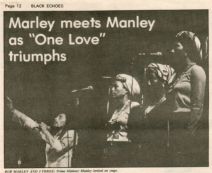Bob Marley and the One Love Concert
Aaron Flowers
By 1978 violence was still widespread in Jamaica, causing a need for reform. Heading this reform were heads of the PNP and JLP, Seaga and Manley, both key figures in Jamaica before 1978. “Both candidates for prime minister travelled with recorded or live musical shows, and both customarily joined in singing the highly political lyrics” stemming from what Marley had preached before them (Kinzer, 1). This emphasizes the important of music in the Caribbean, specifically Jamaica. Even though Marley didn’t want to become involved with politics, it is clear that his previous music had affected many people. This attracted the attention of all political groups, and eventually “Reggae music, the driving, rhythmic style that Marley popularized, was heard at every campaign stop as candidates and voters alike sang, danced and chanted” (Kinzer 1). Using this new strategy, both Seaga and Manley urged Marley to return from his self-implemented exile and return to Jamaica for the One Love Concert. The idea was to use Marley as an icon to promote between the JLP and PNP, and all political spectrums. It is important to note how Marley was the aim to headline this concert because who else would have been a better candidate to headline it than Marley? His previous concert, the Smile concert, mixed with his messages of anti-imperialism, peace, love and others, crafted him into the perfect icon for the One Love Concert. Looking at the concert, Marley sealed his legacy during this event. Calling it the “One Love” concert shows the significance of Marley being at the event, since it is named after one of his most famous songs. Marley went on to perform “One Love” at the concert, becoming the focal point of the show.
In his song “One Love” Marley sings about people putting aside violence and their differences in favor of love. In the first verse Marley sings, “hear the children crying, hear the children crying.” Using children as his example, Marley gains the attention of his audience using sympathy. For the sake of children, Marley attempts to get people to stop the violence, fighting and oppression in Jamaica. Singing this at the concert, in front of thousands of people, targets both politicians, and challenges them to stop the violence that has been vivid in the past. Marley later says in the song, “Lets get together and feel alright” after referencing to the Book of Revelation “as it was in the beginning.” By doing this Marley makes his message that people should ignore race, color, and any negative connotations and come together because then we will be “alright” (“One Love” Bob Marley). Specifically Marley, again, through this song, verbally attacks each political party and tells them to stop political conflicts because in the past people were coinciding happily together. If they could do it in the past, why can’t it be achievable now?
At the end of his performance Marley ordered both Seaga and Manley to the stage, which is to be considered one of the most radical decisions Marley made. On their way up to the stage Marley says “I just want to shake hands and show the people that we’re gonna make it right, we’re gonna unite, we’re gonna make it right, we’ve got to unite. The moon is right over my head, and I give my love instead. The moon was right above my head, and I give my love instead” (Bob Marley). During this moment, Marley cemented himself as a political leader in Jamaica. This moment is an iconic moment when analyzing Marley’s political impact in Jamaica. Holding the hands of both Seaga and Manley, holding them up, uniting under Marley created a symbol that the world will never forget.
LINKS: http://www.youtube.com/watch?v=vdB-8eLEW8g
SOURCES: Stephen Kinzer, G. C. (1981, Jun 07). LATIN AMERICA; BOB MARLEY’S LEGACY IS REGGAE POWER; JAMAICA’S FOREMOST ENTERTAINER HAD POLITICAL IMPACT. Boston Globe (Pre-1997 Fulltext). Retrieved from http://search.proquest.com/docview/294095485?accountid=14214

